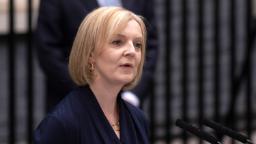[ad_1]

It is going to be costly. The FT reported that the plan may embody £90 billion ($103 billion) in help to households, and as much as £60 billion ($69 billion) for companies, the FT stated.
In that case, that will outstrip the quantity the federal government spent subsidizing the salaries of thousands and thousands of employees in the course of the pandemic to stop mass layoffs by a whopping £80 billion ($91 billion). It will additionally dwarf the €95 billion ($94 billion) the German authorities has promised to date this 12 months to assist its households and companies meet their power prices.
Breaking the financial institution?
Like the remainder of Europe, the UK is grappling with find out how to pay for its formidable aid package deal.
On Wednesday, she dominated out extending the £5 billion ($6 billion) tax former finance minister Rishi Sunak launched in Might on UK oil and gasoline producers to fund an earlier power aid package deal.
“I’m towards a windfall tax,” she informed parliament. “I consider it’s the fallacious factor to be placing firms off investing in the UK simply once we should be rising the financial system,” she added.
Truss has repeatedly promised to chop taxes, fairly than elevate them, within the hope of reviving the ailing financial system. With out a windfall tax, she’s more likely to have to extend authorities borrowing to subsidize payments.
Kwasi Kwarteng, the nation’s new finance minister, additionally indicated over the weekend that extra borrowing was on the way in which.
“Given the severity of the disaster we face, there’ll should be some fiscal loosening to assist individuals by means of the winter,” he wrote within the FT.
That might ship the pound right into a tailspin, which might additional drive up costs and make it more durable to pay for important imports. The forex has already misplaced practically 15% of its worth towards the US greenback this 12 months.
However Britons are in determined want of help, past the £33 billion ($39 billion) the Institute for Authorities (IfG) calculates the federal government has already dedicated this 12 months. That assist has come by means of a mixture of tax cuts, power invoice rebates and direct funds to households, the IfG stated.
With out a new plan to carry down costs, the typical yearly invoice for thousands and thousands may high £5,700 ($6,513) from subsequent April, in line with a Wednesday estimate by analysis agency Auxilione. Payments for small companies are rising at a fair quicker charge.
— Julia Horowitz contributed reporting.

